Huel vs. AG1: Which Greens Powder is Right for You?
Author:
Unlock your full potential by engaging with our experts and community! Have questions about your fitness journey or looking for expert advice on weightlifting techniques? Don’t hesitate — leave a comment below and Jacek Szymanowski will provide a personalized answer and insights to help you reach your goals.
Torokhtiy is reader-supported. Some links are affiliate links, and we may earn a commission at no extra cost to you. See our disclosure page for details.
Taking a foundational nutritional supplement can be a great way to get extra vitamins, minerals, and superfoods into your diet. Huel Greens and AG1 are two of the most popular nutritional supplements out there, but what’s the difference?
In this article, we’ll be taking a closer look at both supplements so you can decide which is right for you!
Before going any further, it’s important to point out that these supplements are meant for nutritional support, and are not a substitute for eating a healthy, balanced diet. We recommend consulting with a nutritionist if you have any questions about incorporating Huel or AG1 into your diet.
Huel vs. AG1 – Both Huel Daily Greens and AG1 are very similar supplements that contain similar formulas. While they are similar, keep in mind that AG1 is also much more expensive. Overall, both of these supplements are excellent choices for anyone after a foundational nutritional supplement.
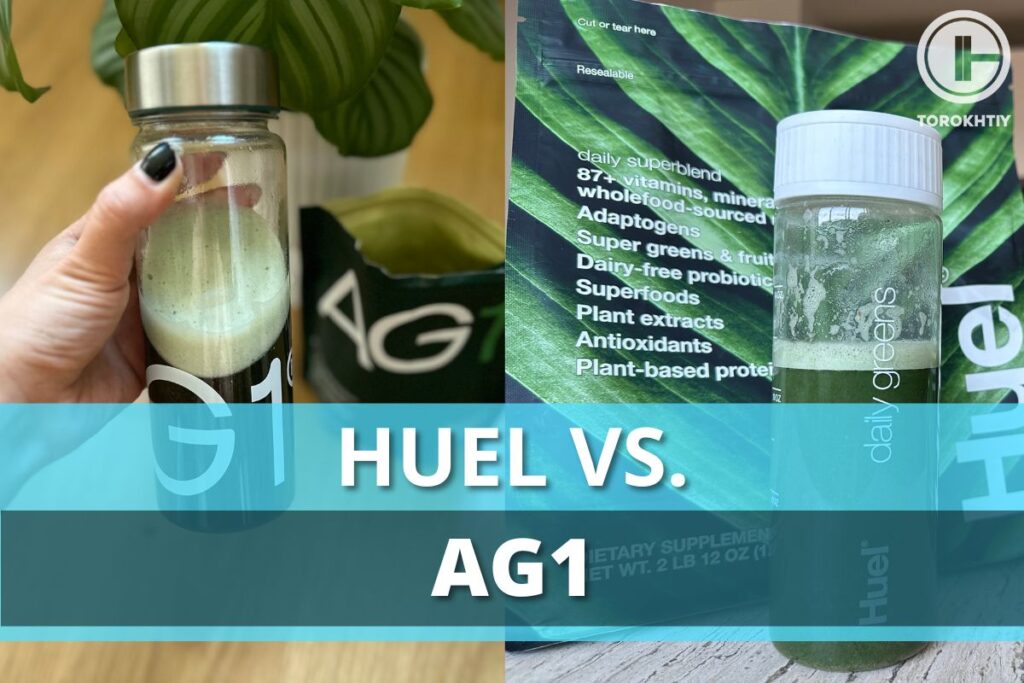
What is Huel Daily Greens?
Huel Daily Greens
- Item Form: Powder
- Flavor: Unflavored
- Probiotics: 3mg
- Added Sweeteners: Organic Stevia Leaf Extract
- Special Ingredients: Plant-Based Protein and Superfood Blend, Organic Antioxidant Greens Blend, Organic Superfruit Blend, Organic Adaptogen and Super Mushroom Complex, Organic Botanical Blend
- Package Information: 480g (30 Servings)
- Serving: 16g
- Company Founded: 2015
- Recommended by Athletes: Russ Cook, Brian Zarzuela, Karenjeet Bains
Huel is a nutrition company most well known for its high-protein meal replacement drinks. However, today we’ll be covering Huel Daily Greens, which is a nutritional supplement designed to provide immune support, stress reduction, and improved gut health.
This supplement contains 26 vitamins, and minerals, as well as a whole host of other potentially beneficial natural ingredients. Many of its vitamins and minerals are dosed at 100%+ of your recommended DV, such as Vitamin A, Vitamin C, and Vitamin D.
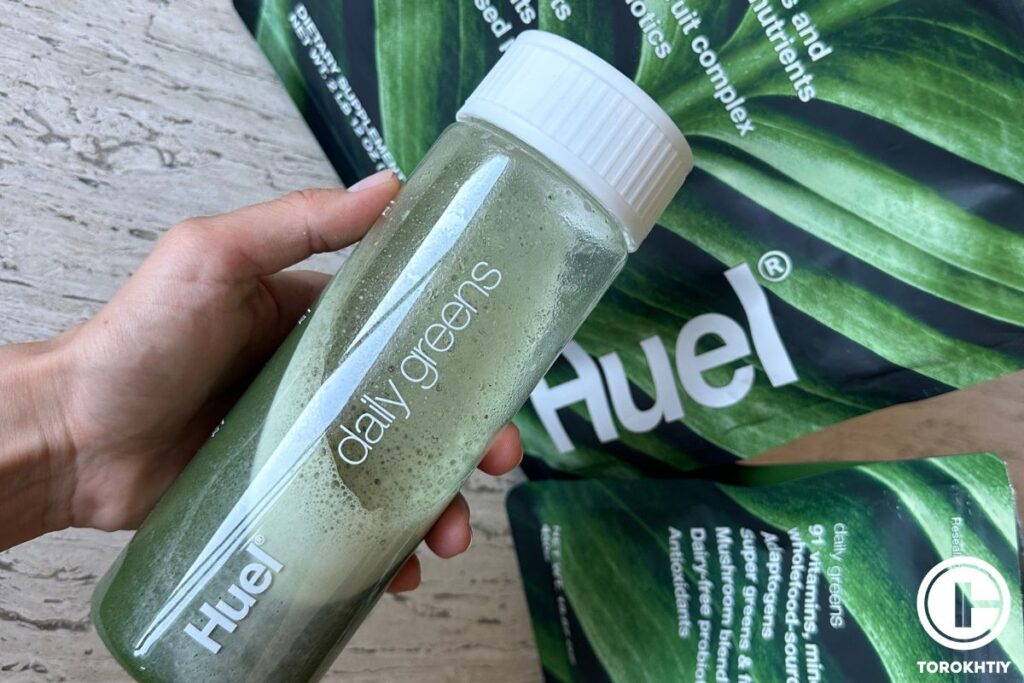
However, many others are dosed well below 50%, such as Magnesium, Iron, and Vitamins B1 and B2, but don’t necessarily think it is inherently bad.
Overall, Huel has a fairly similar nutritional profile to many multivitamins, containing Iron, Vitamin D, and several other micros that AG1 does not. It also contains 50 calories, broken down between 1g of fat, 8g of carbs, and 3g of protein.
One downside to this product is that it doesn’t contain any third-party certifications. However, Huel’s major advantage is that it comes at a much lower price point than many other similar nutritional supplements, and costs about half as much as AG1.
Huel has a fairly similar nutritional profile to many multivitamins, containing Iron, Vitamin D, and several other micros that AG1 does not.
Positives:
Could be better:
What is AG1?
AG1
- Item Form: Powder
- Flavor: Unflavored
- Probiotics: 54mg
- Added Sweeteners: Stevia
- Special Ingredients: Alkaline, Nutrient-Dense Raw Superfood Complex, Nutrient Dense Extracts, Herbs & Antioxidant, Digestive Enzyme & Super Mushroom Complex, Dairy Free Probiotics
- Package Information: 360g (30 Servings)
- Serving: 12g
- Company Founded: 2010
- Recommended by Athletes: Kate Glavan, Colin O Brady, Tez Steinberg
AG1 has become a pioneer in the nutritional supplement space, and has been continuously improving its product over the past 14 years. This shows a commitment to the refinement of their product and a commitment to being the best nutritional supplement possible.
AG1 contains over 70 ingredients designed to potentially provide a foundational source of many different vitamins, minerals, and other wholefood ingredients.
AG1 claims their blend is specifically designed to help with mental performance, energy levels, stress support, and immune function but all of these enhancement benefits should be of course, like in the case of the majority of the supplements, taken with a grain of salt.
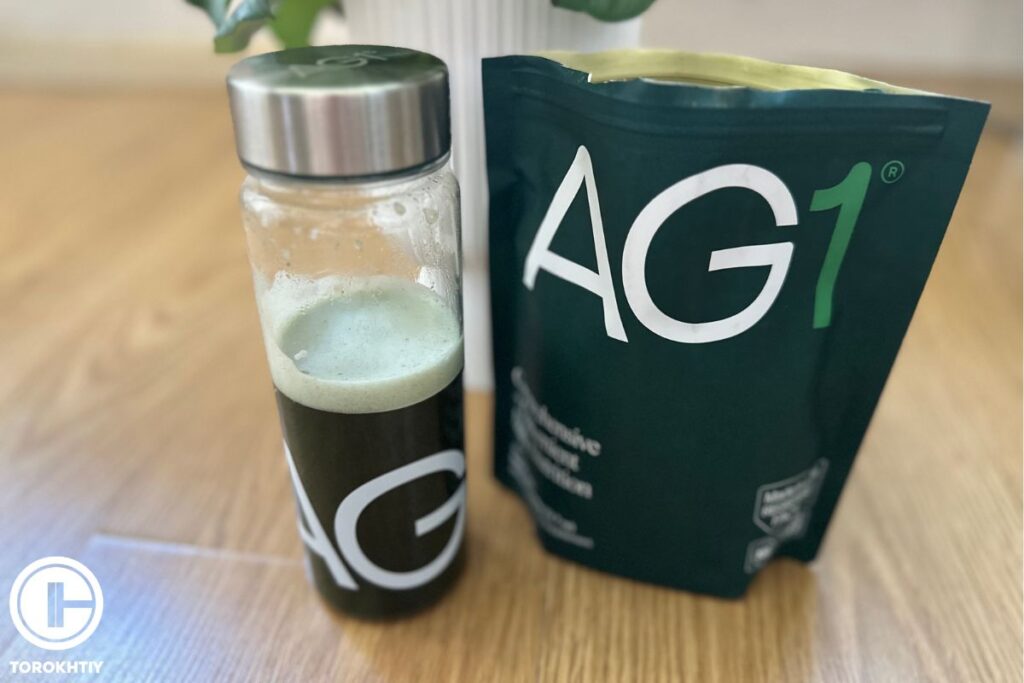
In terms of nutrients, AG1 is similar to Huel, in that many of its vitamins and minerals are dosed well above 100%, while several others are dosed much lower. It contains 21 total vitamins and minerals in total, which is slightly less than Huel’s 26. However, AG1 does contain a significantly higher dose of probiotics, although likely still not enough to have any significant effects.
Along with its micronutrients, AG1 also has a similar macronutrient profile to Huel. It also contains 50 calories, broken down between 6g of carbs, 2g of protein, and 0g of fat.
One advantage to AG1 over Huel is that it is NSF Certified for Sport, which guarantees a high level of quality, and ensures that AG1 contains no potentially banned substances. However, it must also be noted that AG1 has faced a lawsuit in the past relating to the purity of their supplement.
It’s also worth noting that AG1 is very expensive for what you’re getting, especially when compared to Huel. While it is an exceptionally high-quality product, be aware that you will be paying a premium for it.
AG1 contains over 70 ingredients designed to potentially provide a foundational source of many different vitamins, minerals, and other wholefood ingredients.
Positives:
Could be better:
Huel vs AG1
So, which product is better - Huel Daily Greens or AG1? In short, both products are excellent choices, although they do both have certain advantages over each other.
Below we’ll be taking a closer look at the individual components of both Huel and AG1 so you can decide which product will better suit your needs.
| Huel | AG1 | |
|---|---|---|
| Number of Ingredients | 91 | 70+ |
| Taste/Flavor | - Pineapple, Apple, Mint, Lime - May be gritty and unpleasant to some | - Pineapple, Vanilla - May be gritty and unpleasant to some |
| Third-Party Certification | N/A | NSF for Sport |
| Price per Serving | ~$1.67 | ~$2.48-3.30 |
1. Ingredients Breakdown
First, let’s take a look at what ingredients you can find in both Huel and AG1. Like many nutritional supplements, both of these options are composed of several specialized ingredient blends, including “superfoods”, and antioxidants.
AG1 contains over 70 ingredients, while Huel includes 91. These ingredients are split between several blends in both supplements. They are dosed as follows:
AG1 Blends and Doses
| Blends | AG1’s Dose |
|---|---|
| Alkaline, Nutrient-Dense Raw Superfood Complex | 8464mg |
| Nutrient Dense Extracts, Herbs & Antioxidant | 2551mg |
| Digestive Enzyme & Super Mushroom Complex | 170mg |
| Dairy Free Probiotics | 54mg |
| Total Dose | 11.2g |
Huel Blends and Doses
| Blends | Huel’s Dose |
|---|---|
| Plant-Based Protein and Superfood Blend | 8464mg |
| Organic Antioxidant Greens Blend | 2551mg |
| Organic Superfruit Blend | 520mg |
| Organic Adaptogen and Super Mushroom Complex | 170mg |
| Organic Botanical Blend | 122mg |
| Probiotics | 3mg |
| Total Dose | 11.8g |
While Huel and AG1’s blends contain slightly different ingredients, there is a fair amount of overlap. Despite having different names, the blends contain similar formulas and are dosed fairly similarly as well.
One key difference is that AG1 contains significantly more probiotics, although supplementing with probiotics likely isn’t too beneficial anyway. Huel also offers a larger serving size at 16g compared to AG1’s 12g serving.
Overall, because both of these supplements contain so many ingredients that are included in proprietary blends and complexes, it’s difficult to compare every ingredient individually. While Huel contains more ingredients than AG1, both supplements will likely have a very similar overall effect.
Keep in mind that many of their ingredients are likely underdosed, which means their effects will be less potent or entirely nonexistent.
2. Taste/Flavor
Once again, Huel and AG1 will likely deliver similar tastes and textures. Some people will find the taste more off putting than most, but both Huel and AG1 have overall positive reviews regarding taste and texture.
Huel promises that their supplement will have the taste of apple, pineapple, lime, and mint. AG1 makes similar promises, claiming their product has “the refreshing taste of pineapple and vanilla.”
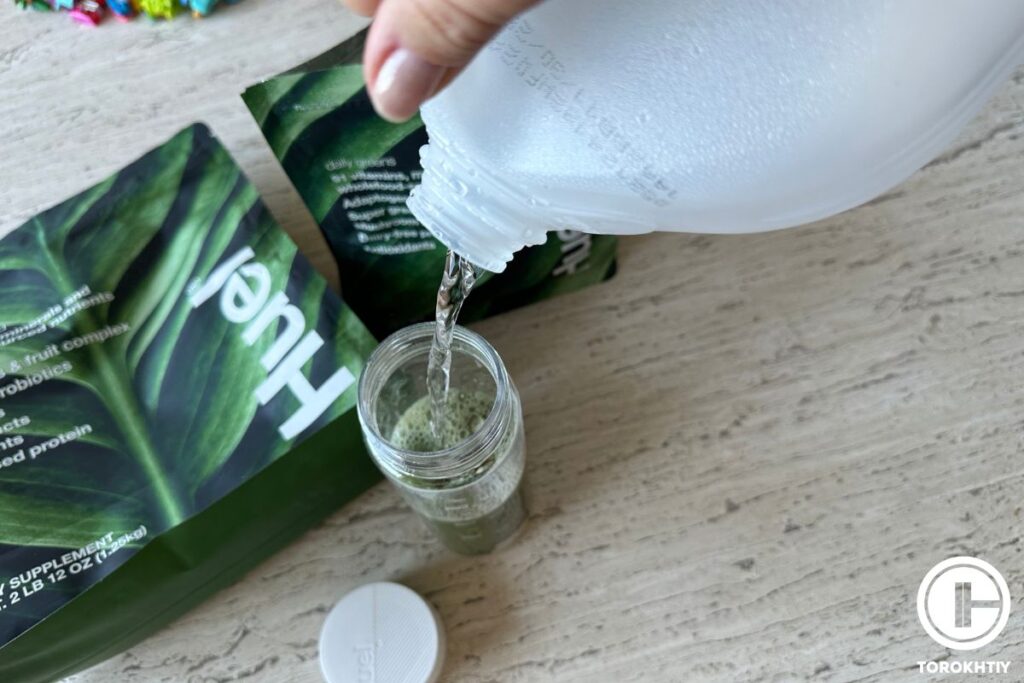
While the taste of these supplements certainly isn’t for everybody, it’s difficult to say that one will taste any better than the other. In both cases it’s good enough to keep drinking it and the taste won’t stop you if you like the formula.
3. Nutrition Label Transparency
Both of these supplements offer very clear nutrition labels that show all their ingredients and the doses of each vitamin and mineral. One major issue is that all ingredients are listed in different blends, so it’s impossible to say how much of any single ingredient you’re getting in each serving.
4. Value for Money
Value for money is where the most major difference lies between Huel and AG1.
Huel is one of the most affordable nutritional supplements on the market, especially considering the overall quality of the product. Each serving will cost you roughly ~$1.67, making it a great choice for anyone shopping on a budget.
Meanwhile, AG1 is significantly more expensive. When buying a single bag of AG1, the price works out to be ~$3.30 per serving, which is just about double the price of Huel. However, buying a subscription will lower the price slightly.
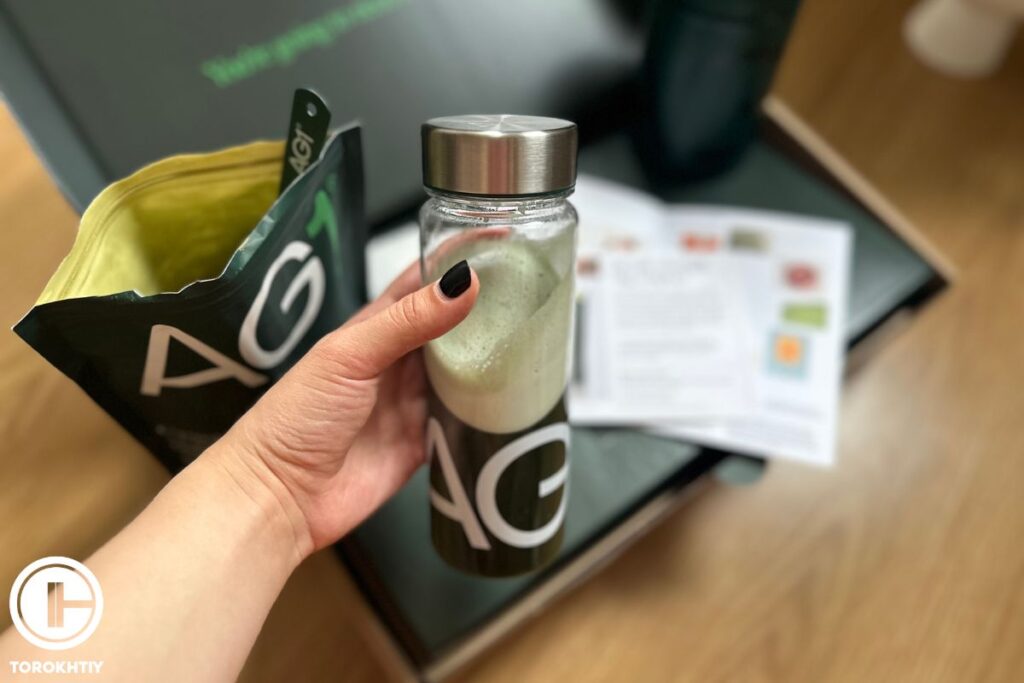
A monthly subscription drops the price to ~$2.63 per serving and includes several bonuses like a canister, shaker, and travel packs. A double monthly subscription of two bags will drop the price slightly lower to ~$2.48. The double subscription also comes with a year’s supply of Vitamin D3+K2 (although Huel’s product already contains these two micronutrients).
Overall, Huel offers better overall value when compared with AG1. However, despite the high price point, AG1 is still an option for anyone after a premium nutritional supplement.
5. Third-Party Certifications
Whenever you’re buying supplements, it’s a good idea to keep an eye out for third-party certifications that can help you gauge the quality of different products.
One downside to Huel is that it doesn’t advertise any third-party certifications. They do claim they perform independent testing, although it’s unclear where. Meanwhile, AG1 is NSF Certified for Sport, which guarantees a high level of potency, and ensures the substance contains no banned substances whatsoever.
While this doesn’t necessarily mean Huel is a lower-quality product, it just means AG1 has a strong third-party source verifying its clean from banned substances.
6. Potential Side Effects
One issue worth pointing out with these supplements is that many people have reported nausea and other gastrointestinal issues when starting with them.
When searching through reviews for AG1, numerous people note an upset stomach, especially when first trying it. Numerous Amazon reviews for Huel mention similar side effects.
While most people will likely be fine, this is something to keep in mind before trying either Huel or AG1. It may be advisable to start with smaller doses to see if the supplement agrees with you before taking any full scoops. If you experience any side effects with either supplement, we recommend ceasing use and consulting with a doctor before continuing.
Overall, if you feel worse when using either of these supplements – stop taking them. If they make you feel better, and you feel they’re worth the money, by all means continue.
Huel vs AG1: Summary
As you can probably tell, Huel and AG1 are very similar products. If you’re looking for a foundational multivitamin and mineral nutritional supplement made with high-quality ingredients, you probably can’t go wrong with either of these ingredients.
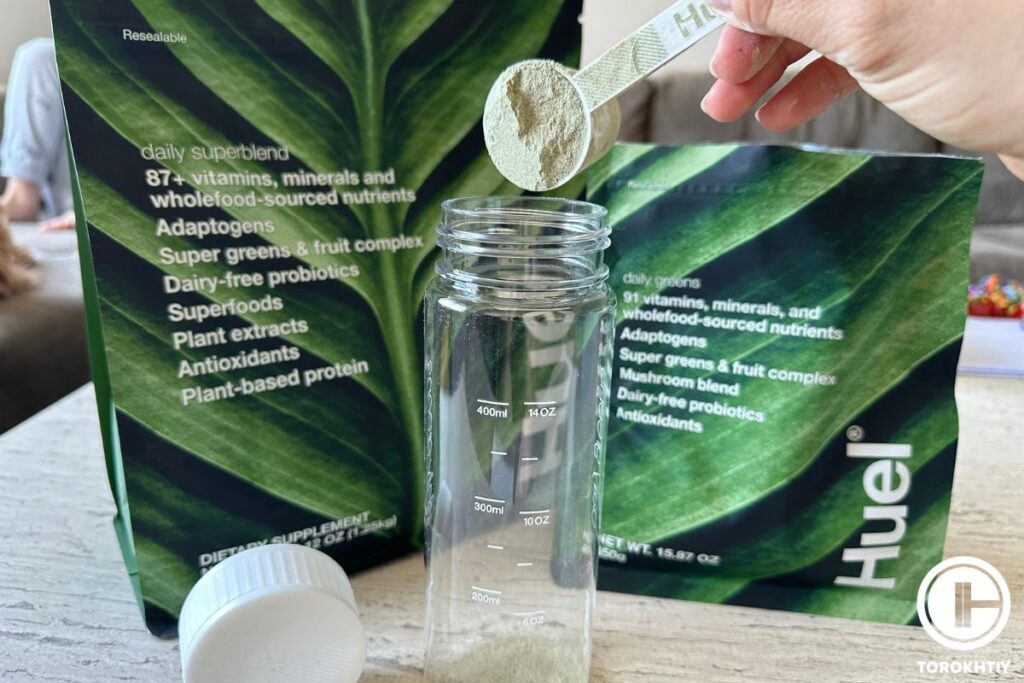
The major difference between these two products is the price. AG1 is nearly twice as expensive as Huel, and may very well be out of many people’s budgets. With this being said, AG1 has a few notable advantages including being NSF Certified and having significantly more probiotics per serving. However, these minor advantages hardly justify the massive jump in price.
Overall, because of the drastic price difference, we would likely recommend Huel for most people. However, if budget isn’t an issue, AG1 is another fantastic alternative.
Pros/Cons of Huel
Positives:
Could be better:
Pros/Cons of AG1
Positives:
Could be better:
Conclusion
Overall, you probably can’t go wrong whether you’re choosing either Huel Greens or AG1. These are both quality nutritional supplements, which have their unique advantages and disadvantages.
Overall, they will be best suited to those who need to fill major gaps in their diets (vegans, carnivores, keto, etc.), otherwise they likely won’t be necessary. Also, if you experience any side effects, you should stop using them immediately.
While both options are excellent choices, we would recommend Huel to most people because of its more affordable price. With this being said, if you’re willing to pay a bit more, AG1 has a few unique advantages including more probiotics and better third-party certifications.
Have you tried either Huel or AG1? Have you used any other nutritional supplements like these? Let us know your thoughts in the comments below!
Also Read:
- AG1 Review: Is this Nutritional Supplement Right for You?
- Huel Daily Greens Review
- Gnarly Nutrition Reviews
- What Is Post Workout Supplement? Do You Need It?
References:
- The Nutrition Source, “Vitamins and Minerals,” Harvard T.H. Chan School of Public Health, https://nutritionsource.hsph.harvard.edu/vitamins/ (Accessed July 25, 2024)
- Howard E. Lewine, MD, “How to Boost Your Immune System,” Harvard Health Publishing https://www.health.harvard.edu/staying-healthy/how-to-boost-your-immune-system (Accessed July 25, 2024)
- Staying Healthy, “Understanding Antioxidants,” Harvard Health Publishing, https://www.health.harvard.edu/staying-healthy/understanding-antioxidants (Accessed July 25, 2024)
- Nutrition, “Probiotics and Prebiotics: What’s Really Important,” Harvard Health Publishing https://www.health.harvard.edu/nutrition/are-you-getting-essential-nutrients-from-your-diet (Accessed July 25, 2024)
- NSF, “NSF’s Certified for Sport”, nsfsport.com https://www.nsfsport.com/ (Accessed July 25, 2024)
- Photos by Torokhtiy Media Team.
Why Trust Us?
With over 20 years in Olympic weightlifting, strength training, nutrition coaching, and general fitness our team does its best to provide the audience with ultimate support and meet the needs and requirements of advanced athletes and professional lifters, as well as people who strive to open new opportunities and develop their physical capabilities with us.
By trusting the recommendations of our certified experts in coaching, nutrition, and sports training programming, as well as scientific consultants, and physiotherapists, we provide you with thorough, well-considered, and scientifically proven content. All the information given in the articles concerning workout programming, separate exercises, and athletic performance, in general, is based on verified data.
The product testing process is described in more detail here.
Author: Jacek Szymanowski
Certified Nutritionist,
M.Sc.Eng. Biotechnology
Performance Architect,
Strength and Conditioning Specialist
With over 30 years of fighting experience, specialization in nutrition coaching for athletes, and expertise in metabolic health and dietary strategies, Jacek offers a comprehensive approach to optimizing your performance and well-being. Backed by a Master of Science degree in Biotechnology, Jacek remains at the forefront of scientific advancements, ensuring that his coaching is always evidence-based and up-to-date.


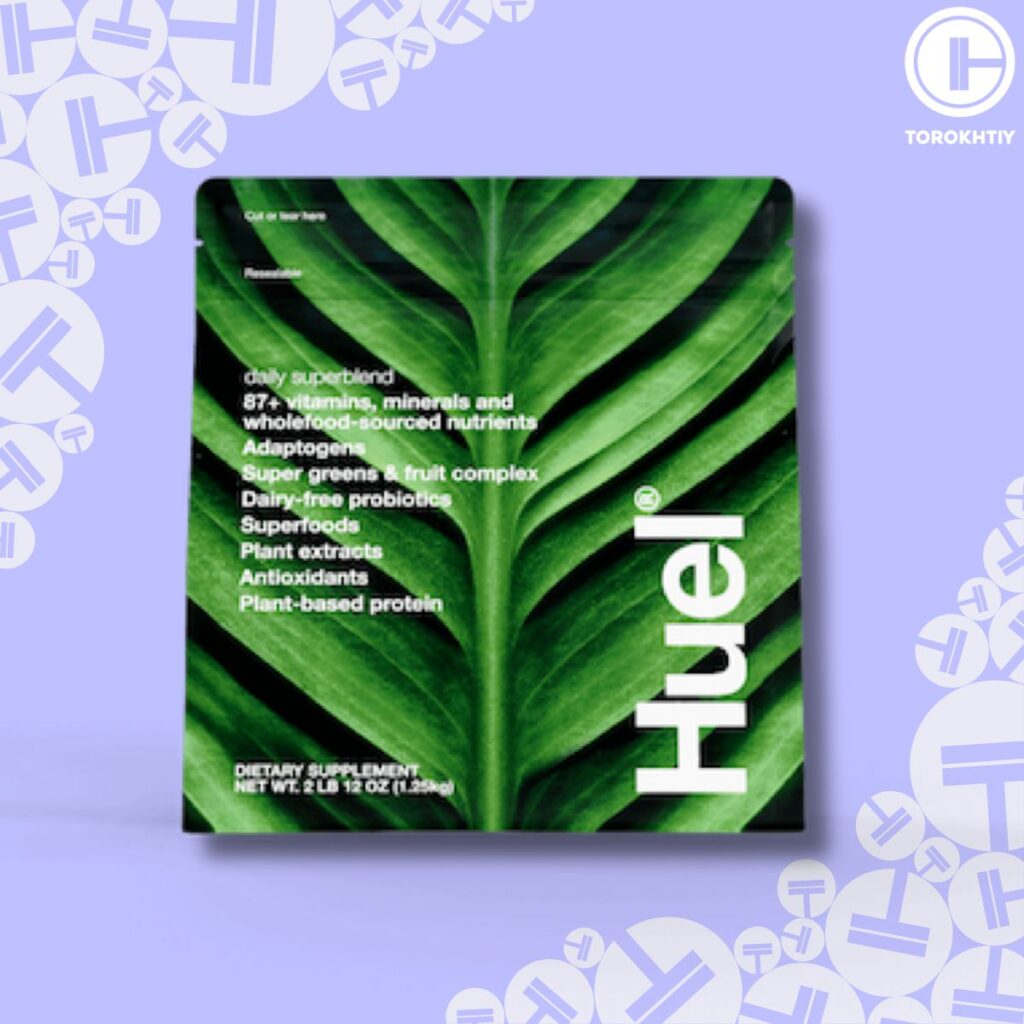

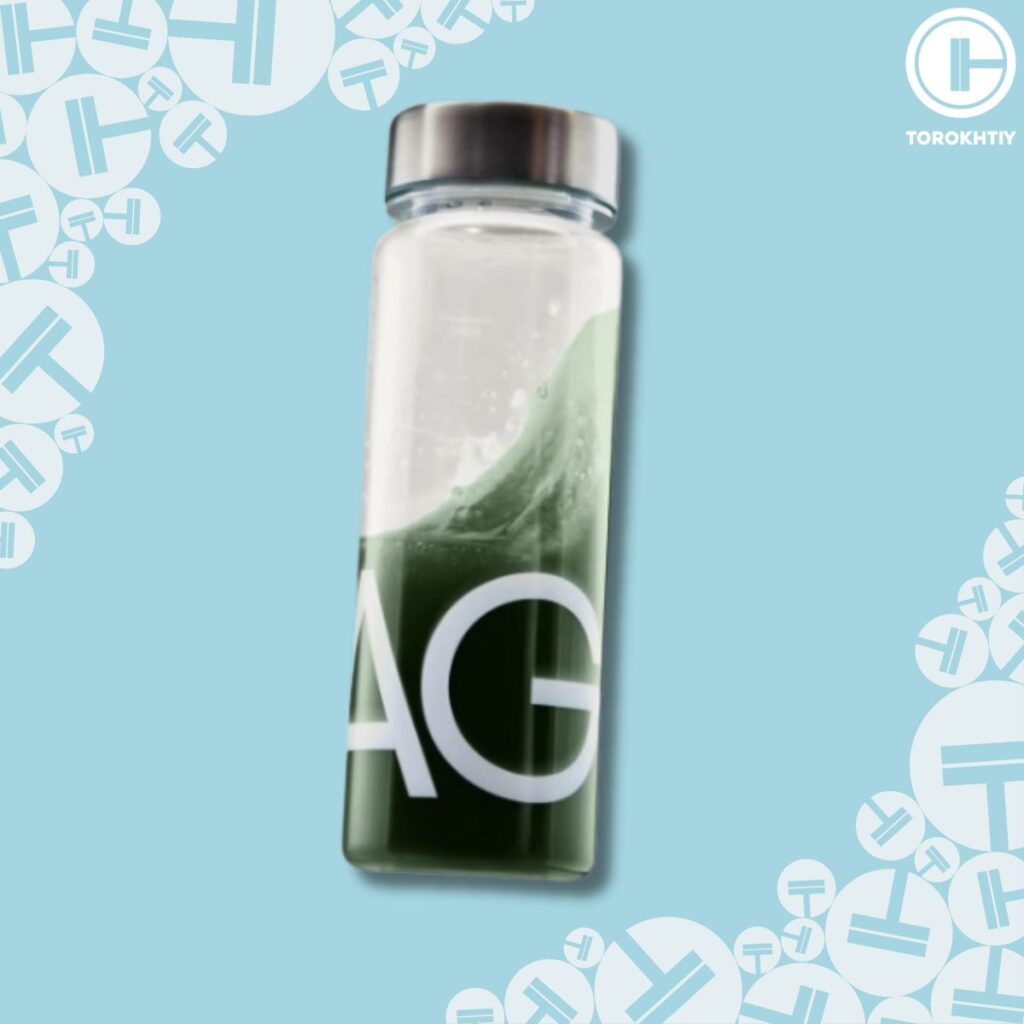
Still have questions after reading our article? Unlock your full potential by engaging with our experts and community! Don’t hesitate — leave a comment below and Jacek Szymanowski will provide a personalized answer and insights to help you reach your goals.